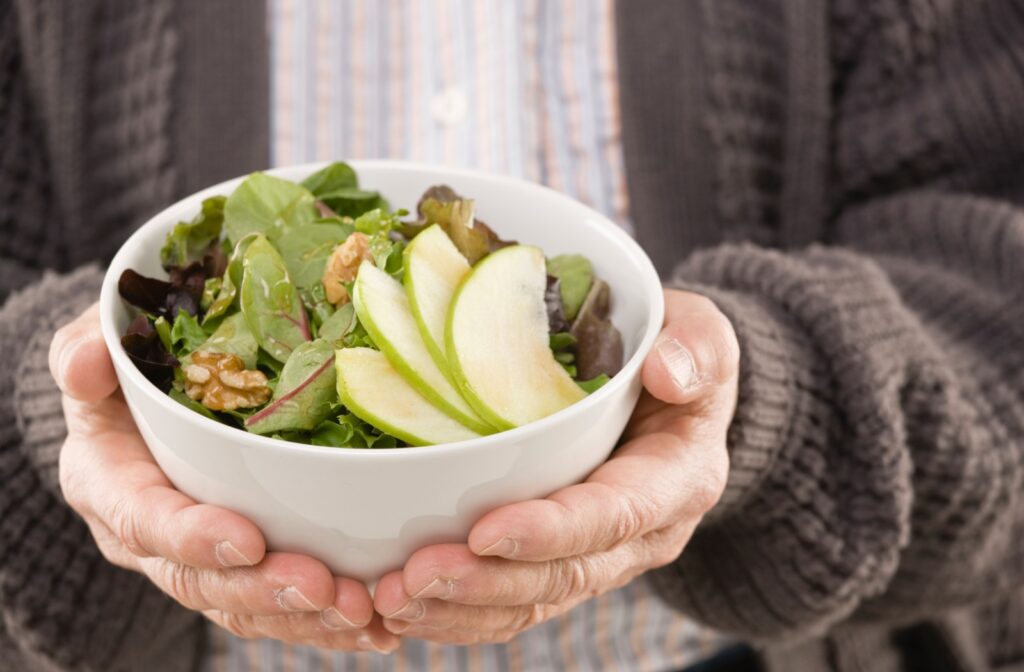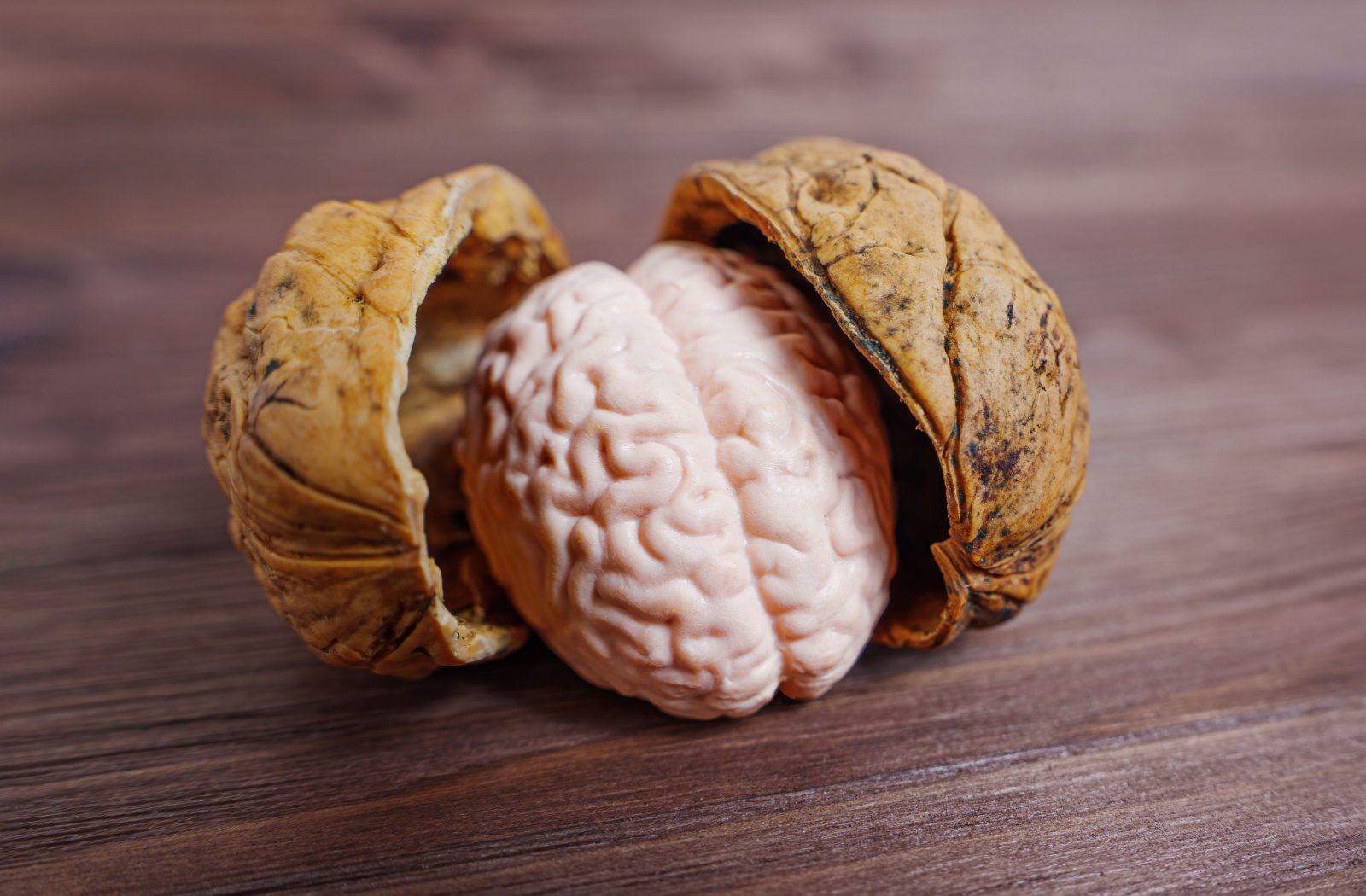As we age, maintaining cognitive wellness is key to living independently and enjoying life to the fullest. While there’s no magic pill to stop cognitive decline, research highlights the power of nutrition in keeping our minds sharp.
Seniors should focus on brain-boosting foods like leafy greens, fatty fish, berries, nuts, and whole grains. These nutrient-rich options support memory, focus, and overall brain health.
Making thoughtful food choices at mealtime is a simple yet effective way to nourish both body and mind.
Key takeaways:
- Eating nutrient-rich foods can help support memory, focus, and overall brain health.
- Leafy greens, fatty fish, berries, nuts, and whole grains are excellent brain-boosting options.
- Prioritizing brain-healthy nutrition is a simple and effective way to promote cognitive wellness.
Understanding Cognitive Health & Diet
Cognitive health refers to your ability to think, learn new things, remember information, and make decisions. It encompasses memory, attention, language skills, and problem-solving abilities that help you navigate daily life with confidence.
Diet impacts brain health through multiple pathways. The foods you eat provide essential nutrients that support brain cell function, reduce inflammation, and protect against oxidative stress—a process that can damage brain cells over time.
Poor nutrition, on the other hand, can accelerate cognitive decline and increase the risk of dementia.
Your brain uses about 20% of your daily calories, making proper nutrition crucial for optimal mental performance. By choosing the right foods, you’re giving your brain the fuel it needs to stay healthy and function at its best.
Brain-Boosting Foods Every Senior Should Know
As we age, what we eat plays a vital role in maintaining a sharp mind and a healthy brain. Incorporating certain nutrient-rich foods into your diet can support cognitive function and overall well-being.
Green, Leafy Vegetables
Spinach, kale, collard greens, and other leafy vegetables are packed with nutrients that support cognitive function. These vegetables contain high levels of vitamin K, folate, and antioxidants that help protect brain cells and may slow age-related cognitive decline.
Fish Rich in Omega-3s
Fatty fish like salmon, mackerel, sardines, and tuna provide essential protein and omega-3 fatty acids—essential fats that your body can’t produce on its own. These healthy fats support brain cell structure and may help improve memory and reduce inflammation in the brain.
Berries for Brain Power
Blueberries, strawberries, and blackberries are rich in antioxidants called anthocyanins, which give berries their vibrant colors. These compounds improve communication between brain cells and help maintain memory function as you age.
Walnuts & Other Nuts
Walnuts contain high levels of DHA, a type of omega-3 fatty acid that supports brain health. Regular consumption of nuts has been linked to improved cognitive performance and may help prevent age-related mental decline.
Tea & Coffee
Both tea and coffee contain beneficial compounds that may protect brain health. The caffeine can improve alertness and concentration, while antioxidants in these beverages may help protect against cognitive decline.
Key Nutritional Strategies for Older Adults

As we age, maintaining proper nutrition becomes even more important for overall health and well-being. Simple dietary strategies support cognitive function, physical strength, and energy levels, promoting a vibrant and active lifestyle.
Omega-3 Fatty Acids
These essential fats are crucial for brain health. Aim to include fatty fish in your diet twice a week, or consider walnuts, flaxseeds, and chia seeds as plant-based alternatives.
Polyphenols
Found in colorful fruits and vegetables, polyphenols are potent antioxidants that help protect brain cells from damage. Berries, dark chocolate, and green tea are excellent sources.
Vitamin E
Vitamin E is an antioxidant that helps protect cell membranes in the brain. You’ll find vitamin E in nuts, seeds, and vegetable oils.
Manganese
Manganese is a mineral that supports brain function. You can find it in whole grains, nuts, and leafy green vegetables.
The Mediterranean Diet Approach
Research consistently shows that following a Mediterranean-style diet—rich in fruits, vegetables, whole grains, fish, and healthy fats like olive oil—may help preserve cognitive function and reduce the risk of dementia.
How Senior Living Communities Support Healthy Eating
Quality senior living communities understand the vital connection between nutrition and cognitive wellness. At Parsons House La Porte, dedicated culinary teams work to create menus that can offer great taste and support our residents’ overall health and brain function.
These communities often feature:
- Nutritionist-designed menus incorporating brain-healthy ingredients
- Meals featuring fresh, locally-sourced produce when possible
- Dining programs that accommodate individual dietary needs and preferences
- Social dining experiences that make meals enjoyable and engaging
- Education about nutrition and its role in healthy aging and wellness
The advantage of community dining goes beyond just good food. Sharing meals with others provides social stimulation, which is equally essential for cognitive health.
The combination of proper nutrition and social engagement creates a robust foundation for maintaining mental wellness.
Taking the Next Step Toward Better Brain Health
Supporting your cognitive wellness through nutrition doesn’t require dramatic changes overnight. Start by incorporating a few brain-healthy foods into your daily routine.
For example, add berries to your morning meal, enjoy a handful of walnuts as a snack, or swap out one meat-based meal per week for fish.
Remember that consistency matters more than perfection. Small, sustainable changes in your eating habits can make a meaningful difference in your long-term brain health and overall quality of life.
Parsons House La Porte is a community where our residents feel safe, loved, appreciated, and cared for. From the second you walk in our doors, you’ll feel right at home.
Contact us today to learn how our community helps seniors prioritize nutrition and wellness as part of their comprehensive approach to healthy aging.



